“The blues had a baby and they named it rock ‘n’ roll.”
That lyric, from a latter-day Muddy Waters song, is pretty much received wisdom when it comes to understanding the music’s roots. Yet just as essential to the fledgling form was the role of gospel music.
From the very beginning, the church has had an undeniable – and ongoing – influence on rock ‘n’ roll music. From those who left, to those who returned, and every permutation in between, the list is extensive.
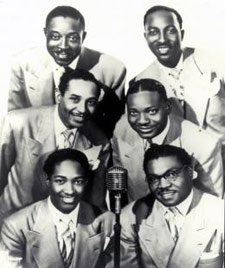
with the Soul Stirrers
Sam Cooke, Wilson Pickett, Lou Rawls and Johnnie Taylor all started as gospel singers before finding mainstream success.
Others headed in the opposite direction.
At the height of his fame in 1957, flamboyant rocker Little Richard threw his jewelry into the sea and announced his retirement, allegedly to become a Seventh Day Adventist Pastor. He returned a few years later, setting up a pattern of moving between the sacred and the secular that continues to this day.
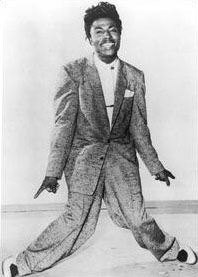
Other conversions were less dramatic; rockabilly Queen Wanda Jackson, Al Green and Candi Staton all managed to serve in various ministry positions without abandoning the music that first brought them fame.
As a freelance musician, I’ve had the opportunity to work with a few Rock And Roll Hall of Fame members, including Bo Diddley the same year he was inducted. He was hardly impressed with his inclusion, lamenting how, despite the honor, record companies continued to rip him off.
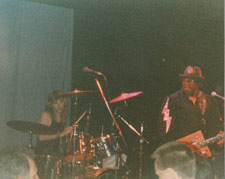
We discussed a wide range of issues before and after the show, including his longstanding faith – a subject rarely mentioned in biographies on the man. He was familiar with scripture, even quoting a few passages. Years later, he announced plans to record an album of gospel material, but passed away before the project came to fruition.
Buddy Holly had also planned on recording a gospel album before his death in a plane wreck at 22 years old. Despite a biographical film that played fast and loose with the facts, Holly was a churchgoer who faithfully tithed his earnings to a local church throughout his brief career.
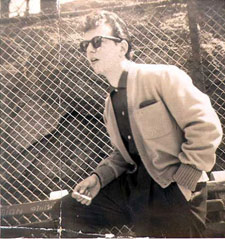
Doo Wop legend Dion DiMucci battled a heroin habit throughout his hit making years, until 1968, when he returned, rejuvenated with ‘Abraham, Martin and John.’ Twenty years later, he wrote about his struggle and road to faith in The Wanderer: Dion’s Story. When I spoke with him a few years ago, it was evident his faith continues to remain vital and vibrant.
Like fellow Hall of Famer ‘Little’ Anthony Gourdine (Little Anthony and the Imperials), Dion recorded for Christian labels in the 1980s, eventually returning to mainstream. In Dion’s case, out of frustration over questionable business practices; both remain active in the church today.
Ironically, Dion – who turns 71 this year – and Little Anthony – one year younger – appeared far more focused and energetic that the relatively younger performers at the recent Rock And Roll Hall of Fame Concert.
Raised in the Pentecostal church, Elvis Presley dreamt of singing gospel, and in 1953, auditioned for the Songfellows, an offshoot of the legendary Blackwood Brothers. It was only after he failed – the group claimed he couldn’t sing harmony – that his future as the King of Rock began to take shape.
Presley earned three Grammy Awards over the course of his career, all for gospel recordings, which remained a staple in his repertoire. He even hired the Blackwood’s J.D. Sumner, who as leader of the Stamps Quartet sang with Elvis right up until his death.
Johnny Cash experienced a similar false start; he sang gospel – and only gospel – when he auditioned for Sun Records’ owner Sam Phillips.
Claiming there was no market for the music, Phillips turned him down, telling him to go home and learn something more commercial.
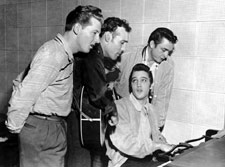
He returned a few days later with his first hit, ‘Hey Porter,’ but, like Presley, incorporated gospel into his performances for the rest of his career.
In his 1977 autobiography, Disciple in Blue Suede Shoes, Carl Perkins wrote of his own faith journey, which took him from hit records and addictions to a whole-hearted return to the church later in life.
Along with his cousin Jimmy Swaggart, Jerry Lee Lewis attended Southwestern Assemblies of God University. When he was kicked out for playing boogie woogie piano version of ‘My God Is Real,’ a career in ministry was forsaken; and Lewis become one of the true wild men of rock. Meanwhile, Cousin Jimmy spearheaded numerous crusades against rock music – which he once labeled ‘the new pornography’ – until a pair of sex scandals brought his own ministry down.
In 1958, the four Sun stars – Presley, Cash, Perkins and Lewis – were captured in an informal recording. Dubbed the Million Dollar Quartet, many of the selections were gospel, a common bond they all shared.
© John Cody 2010